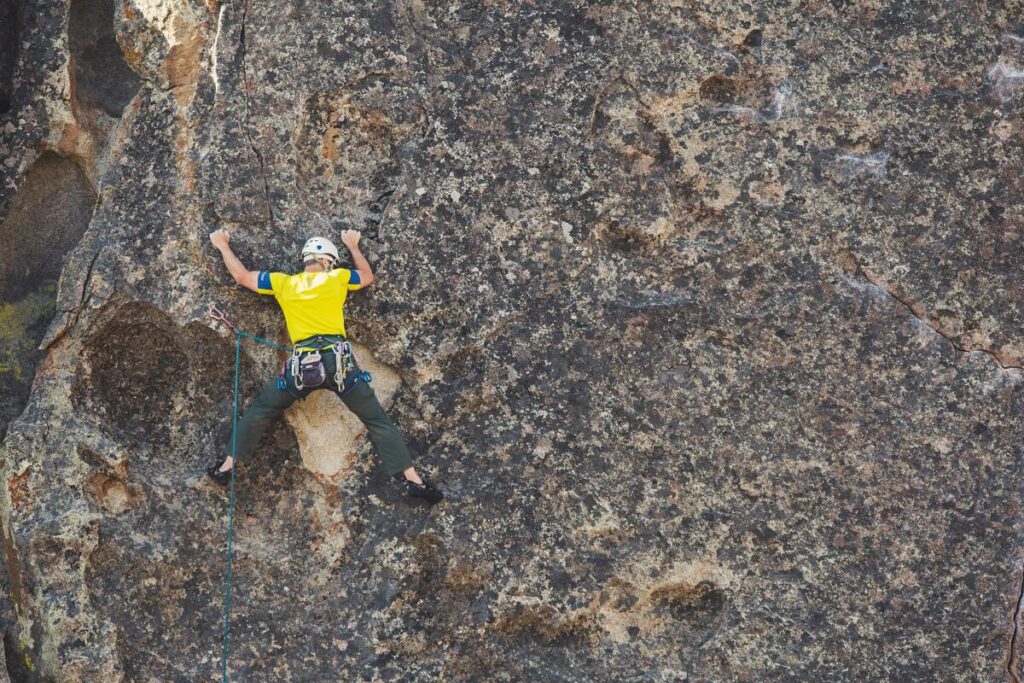Rock climbing, an exhilarating sport that combines physical strength, mental focus, and a love for the great outdoors, has gained immense popularity in recent years. This challenging activity involves ascending rock formations using specialized equipment and techniques. Beyond being a thrilling adventure, rock climbing offers a wide range of benefits for individuals of all ages and fitness levels. In this post, we will explore the numerous advantages of rock climbing and why it has captivated the hearts of adventurers worldwide.

Physical Fitness:
- Rock climbing is a demanding physical activity that engages various muscle groups, providing an excellent full-body workout. Here’s how it benefits your physical fitness:
- Strengthens muscles: The act of gripping, pulling, and pushing against the rock surface helps develop muscular strength and endurance.
- Enhances flexibility: Constantly maneuvering and reaching for holds increases joint mobility and overall flexibility.
- Boosts cardiovascular health: Climbing requires sustained effort, which elevates heart rate and improves cardiovascular endurance.
- Promotes weight loss: The combination of intense physical exertion and calorie burning makes rock climbing an effective way to shed excess weight.

Mental Well-being:
- Engaging in rock climbing goes beyond physical fitness; it also has a positive impact on mental well-being. Here are the mental benefits of rock climbing:
- Builds confidence: Successfully scaling a challenging rock face instills a sense of accomplishment and boosts self-confidence.
- Enhances problem-solving skills: Every climb presents unique challenges, requiring climbers to think critically, strategize, and find creative solutions.
- Fosters focus and concentration: Rock climbing demands full attention and concentration, allowing climbers to escape from everyday distractions and achieve a state of mindfulness.
- Reduces stress: Spending time in nature, combined with the physical exertion involved, releases endorphins, leading to reduced stress levels and improved overall mood.

Adrenaline Rush and Sense of Adventure:
- Rock climbing is synonymous with an adrenaline rush and a sense of adventure. Here’s why it appeals to adventure enthusiasts:
- Thrill and excitement: Scaling heights and conquering challenging routes provide an unparalleled rush of adrenaline that fuels the desire for adventure.
- Connection with nature: Rock climbers have the unique opportunity to explore stunning natural landscapes and develop a deep appreciation for the beauty of the outdoors.
- Overcoming fears and pushing limits: Rock climbing pushes individuals out of their comfort zones, helping them conquer fears, develop resilience, and achieve personal growth.
Social Interaction and Teamwork:

- Rock climbing can be a highly social activity, fostering a sense of community and teamwork. Consider the following benefits:
- Shared experiences: Climbing with friends or joining a climbing community allows individuals to bond over shared challenges and triumphs.
- Support and encouragement: Climbing in groups creates a supportive environment where climbers motivate and encourage one another to push their limits.
- Enhances communication skills: Effective communication is crucial for successful climbs, fostering teamwork and trust among climbers.
Improved Balance and Coordination:
Climbing requires precise body movements and balance, leading to improved coordination. These benefits extend beyond the climbing wall and can positively impact daily activities, sports performance, and overall agility. Here’s how rock climbing helps in this regard:
- Body awareness: Climbers develop a heightened sense of body awareness, understanding how to position their limbs and maintain balance on challenging terrain.
- Core strength: Rock climbing engages the core muscles, which are vital for stability and maintaining balance.
- Fine motor skills: Gripping and maneuvering on small holds and cracks enhances hand and finger dexterity, leading to improved fine motor skills.
Climbing with its blend of physical and mental challenges, offers a wide array of benefits for individuals seeking adventure, improved fitness, and personal growth. From the physical fitness gains to the mental well-being advantages and the adrenaline rush of adventure, rock climbing has something to offer everyone. So, lace up your climbing shoes, harness your determination, and embark on an exciting journey of self-discovery through the thrilling world of rock climbing.
Cross-Training Potential:
Rock climbing serves as an excellent cross-training activity, complementing other sports and fitness pursuits. Its diverse physical demands make it an ideal addition to various training routines. Consider the following benefits:
- Upper body strength: Climbing strengthens the muscles in the arms, shoulders, and back, benefiting activities such as swimming, tennis, or kayaking.
- Endurance training: The sustained effort required in climbing helps improve endurance levels, which can enhance performance in activities like long-distance running or cycling.
- Mental focus and concentration: The mental aspects of rock climbing, such as problem-solving and concentration, can transfer to other sports that require mental fortitude, such as martial arts or yoga.
Accessible to All Skill Levels:
One of the fantastic aspects of rock climbing is that it can be tailored to accommodate individuals of different skill levels and abilities. Whether you’re a beginner or an experienced climber, there are options available that suit your capabilities. Here’s how rock climbing caters to diverse skill levels:
- Indoor climbing: Climbing gyms offer controlled environments with varying levels of difficulty, allowing beginners to learn the basics and build their skills.
- Outdoor climbing: Outdoor crags provide a wide range of routes suitable for climbers of different abilities, from easy slab climbs to more challenging vertical or overhanging walls.
- Instruction and guidance: Climbing courses and experienced instructors help novices develop the necessary skills and progress at their own pace.
Environmental Awareness:
Rock climbing promotes a deep connection with nature and encourages environmental stewardship. Climbers develop a profound respect for the natural landscapes they explore, leading to increased awareness and conservation efforts. Here’s how rock climbing fosters environmental consciousness:
- Leave No Trace: The climbing community emphasizes the importance of leaving minimal impact on the environment by following practices such as proper waste disposal, avoiding damage to vegetation, and respecting wildlife habitats.
- Appreciation for nature: Spending time in breathtaking outdoor locations encourages climbers to appreciate and protect natural spaces.
- Advocacy and conservation: Many climbers actively participate in initiatives to preserve climbing areas, supporting organizations dedicated to environmental conservation.

Comments